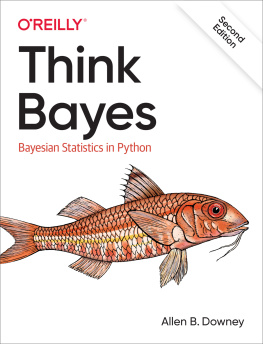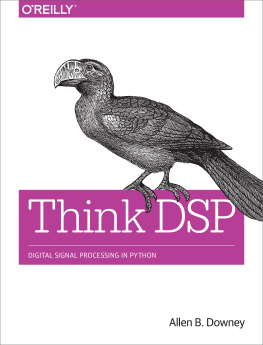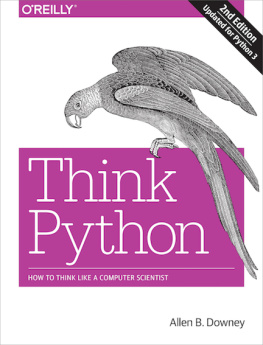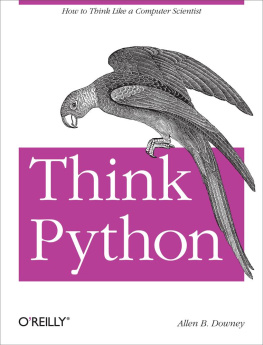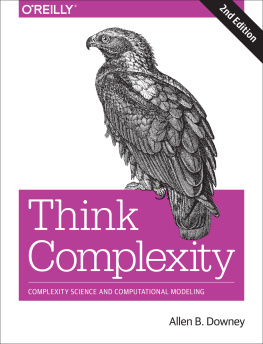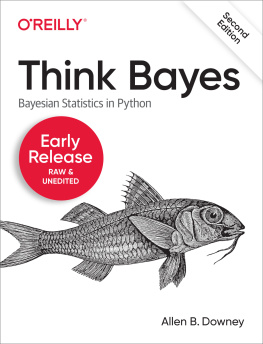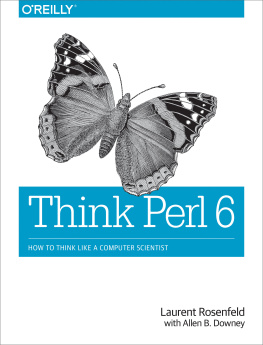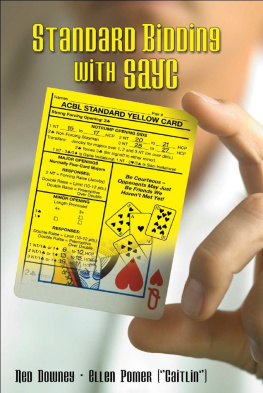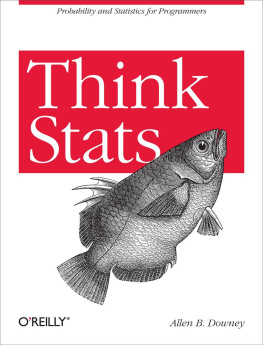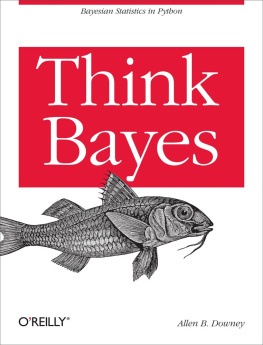Allen B. Downey - Think Bayes
Here you can read online Allen B. Downey - Think Bayes full text of the book (entire story) in english for free. Download pdf and epub, get meaning, cover and reviews about this ebook. year: 2021, publisher: OReilly Media, Inc., genre: Romance novel. Description of the work, (preface) as well as reviews are available. Best literature library LitArk.com created for fans of good reading and offers a wide selection of genres:
Romance novel
Science fiction
Adventure
Detective
Science
History
Home and family
Prose
Art
Politics
Computer
Non-fiction
Religion
Business
Children
Humor
Choose a favorite category and find really read worthwhile books. Enjoy immersion in the world of imagination, feel the emotions of the characters or learn something new for yourself, make an fascinating discovery.
- Book:Think Bayes
- Author:
- Publisher:OReilly Media, Inc.
- Genre:
- Year:2021
- Rating:5 / 5
- Favourites:Add to favourites
- Your mark:
- 100
- 1
- 2
- 3
- 4
- 5
Think Bayes: summary, description and annotation
We offer to read an annotation, description, summary or preface (depends on what the author of the book "Think Bayes" wrote himself). If you haven't found the necessary information about the book — write in the comments, we will try to find it.
Think Bayes — read online for free the complete book (whole text) full work
Below is the text of the book, divided by pages. System saving the place of the last page read, allows you to conveniently read the book "Think Bayes" online for free, without having to search again every time where you left off. Put a bookmark, and you can go to the page where you finished reading at any time.
Font size:
Interval:
Bookmark:

by Allen B. Downey
Copyright 2021 Allen B. Downey. All rights reserved.
Printed in the United States of America.
Published by OReilly Media, Inc. , 1005 Gravenstein Highway North, Sebastopol, CA 95472.
OReilly books may be purchased for educational, business, or sales promotional use. Online editions are also available for most titles (http://oreilly.com). For more information, contact our corporate/institutional sales department: 800-998-9938 or corporate@oreilly.com .
- Acquisitions Editor: Jessica Haberman
- Development Editor: Michele Cronin
- Production Editor: Kristen Brown
- Copyeditor: OReilly Production Services
- Proofreader: Stephanie English
- Indexer: Sue Klefstad
- Interior Designer: David Futato
- Cover Designer: Karen Montgomery
- Illustrator: Allen B. Downey
- September 2013: First Edition
- May 2021: Second Edition
- 2021-05-18: First Release
See http://oreilly.com/catalog/errata.csp?isbn=9781492089469 for release details.
The OReilly logo is a registered trademark of OReilly Media, Inc. Think Bayes, the cover image, and related trade dress are trademarks of OReilly Media, Inc.
The views expressed in this work are those of the author, and do not represent the publishers views. While the publisher and the author have used good faith efforts to ensure that the information and instructions contained in this work are accurate, the publisher and the author disclaim all responsibility for errors or omissions, including without limitation responsibility for damages resulting from the use of or reliance on this work. Use of the information and instructions contained in this work is at your own risk. If any code samples or other technology this work contains or describes is subject to open source licenses or the intellectual property rights of others, it is your responsibility to ensure that your use thereof complies with such licenses and/or rights.
Think Bayes is available under the Creative Commons Attribution-NonCommercial-ShareAlike 4.0 International License. The author maintains an online version at https://greenteapress.com/wp/think-bayes.
978-1-492-08946-9
[LSI]
The premise of this book, and the other books in the Think X series, is that if you know how to program, you can use that skill to learn other topics.
Most books on Bayesian statistics use math notation and present ideas using mathematical concepts like calculus. This book uses Python code and discrete approximations instead of continuous mathematics. As a result, what would be an integral in a math book becomes a summation, and most operations on probability distributions are loops or array operations.
I think this presentation is easier to understand, at least for people with programming skills. It is also more general, because when we make modeling decisions, we can choose the most appropriate model without worrying too much about whether the model lends itself to mathematical analysis.
Also, it provides a smooth path from simple examples to real-world problems.
To start this book, you should be comfortable with Python. If you are familiar with NumPy and pandas, that will help, but Ill explain what you need as we go. You dont need to know calculus or linear algebra. You dont need any prior knowledge of statistics .
In introduces the probability distribution, which is the foundation of Bayesian statistics.
In later chapters, we use a variety of discrete and continuous distributions, including the binomial, exponential, Poisson, beta, gamma, and normal distributions. I will explain each distribution when it is introduced, and we will use SciPy to compute them, so you dont need to know about their mathematical properties.
Most chapters in this book are motivated by a real-world problem, so they involve some degree of modeling. Before we can apply Bayesian methods (or any other analysis), we have to make decisions about which parts of the real-world system to include in the model and which details we can abstract away.
For example, in , the motivating problem is to predict the winner of a soccer (football) game. I model goal-scoring as a Poisson process, which implies that a goal is equally likely at any point in the game. That is not exactly true, but it is probably a good enough model for most purposes.
I think it is important to include modeling as an explicit part of problem solving because it reminds us to think about modeling errors (that is, errors due to simplifications and assumptions of the model).
Many of the methods in this book are based on discrete distributions, which makes some people worry about numerical errors. But for real-world problems, numerical errors are almost always smaller than modeling errors.
Furthermore, the discrete approach often allows better modeling decisions, and I would rather have an approximate solution to a good model than an exact solution to a bad model.
Reading this book will only get you so far; to really understand it, you have to work with the code. The original form of this book is a series of Jupyter notebooks. After you read each chapter, I encourage you to run the notebook and work on the exercises. If you need help, my solutions are available.
There are several ways to run the notebooks:
If you have Python and Jupyter installed, you can download the notebooks and run them on your computer.
If you dont have a programming environment where you can run Jupyter notebooks, you can use Colab, which lets you run Jupyter notebooks in a browser without installing anything.
To run the notebooks on Colab, start from this landing page, which has links to all of the notebooks.
If you already have Python and Jupyter, you can download the notebooks as a ZIP file.
This book is here to help you get your job done. In general, if example code is offered with this book, you may use it in your programs and documentation. You do not need to contact us for permission unless youre reproducing a significant portion of the code. For example, writing a program that uses several chunks of code from this book does not require permission. Selling or distributing examples from OReilly books does require permission. Answering a question by citing this book and quoting example code does not require permission. Incorporating a significant amount of example code from this book into your products documentation does require permission.
We appreciate, but generally do not require, attribution. An attribution usually includes the title, author, publisher, and ISBN. For example: Think Bayes, Second Edition, by Allen B. Downey (OReilly). Copyright 2021 Allen B. Downey, 978-1-492-08946-9.
If you feel your use of code examples falls outside fair use or the permission given above, feel free to contact OReilly Media at .
If you dont have Python and Jupyter already, I recommend you install Anaconda, which is a free Python distribution that includes all the packages youll need. I found Anaconda easy to install. By default it installs files in your home directory, so you dont need administrator privileges. You can download Anaconda from this site.
Anaconda includes most of the packages you need to run the code in this book. But there are a few additional packages you need to install.
Font size:
Interval:
Bookmark:
Similar books «Think Bayes»
Look at similar books to Think Bayes. We have selected literature similar in name and meaning in the hope of providing readers with more options to find new, interesting, not yet read works.
Discussion, reviews of the book Think Bayes and just readers' own opinions. Leave your comments, write what you think about the work, its meaning or the main characters. Specify what exactly you liked and what you didn't like, and why you think so.

